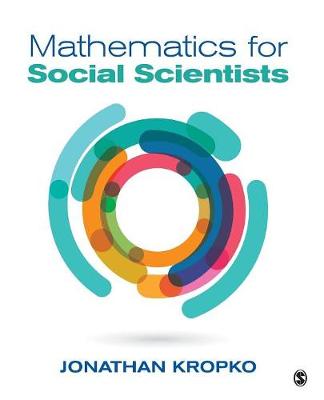
Stock image for illustration purposes only - book cover, edition or condition may vary.
Mathematics for Social Scientists
Jonathan M. Kropko
€ 142.15
FREE Delivery in Ireland
Description for Mathematics for Social Scientists
Paperback. A non-intimidating approach to learning or reviewing math skills essential in quantitative research methods. Num Pages: 408 pages. BIC Classification: JHBC; PB. Category: (G) General (US: Trade). Dimension: 190 x 235 x 27. Weight in Grams: 684.
The text builds students' confidence by presenting material in a conversational tone and using a wealth of clear and applied examples. Author Jonathan Kropko argues that mastering these concepts will break students' reliance on using basic models in statistical software, allowing them to engage with research data beyond simple software calculations.
The text builds students' confidence by presenting material in a conversational tone and using a wealth of clear and applied examples. Author Jonathan Kropko argues that mastering these concepts will break students' reliance on using basic models in statistical software, allowing them to engage with research data beyond simple software calculations.
Product Details
Format
Paperback
Publication date
2015
Publisher
SAGE Publications Inc
Condition
New
Number of Pages
408
Place of Publication
Thousand Oaks, United States
ISBN
9781506304212
SKU
V9781506304212
Shipping Time
Usually ships in 15 to 20 working days
Ref
99-99
About Jonathan M. Kropko
Jonathan Kropko is a professor in the Department of Politics at the University of Virginia, where he also serves on the steering committee of the Quantitative Collaborative, an interdisciplinary research initiative for applied statistics in the social sciences. Previously, he held a postdoctoral research fellowship at the Applied Statistics Center at Columbia University and was a statistics consultant at the H. W. Odum Institute for Research in the Social Sciences at the University of North Carolina. He holds degrees in mathematics (BS) and political science (BA) from Ohio State University, and earned a PhD in political science from the University of North Carolina in 2011. He is a specialist in political methodology, with a focus on missing data imputation, time series, and measurement methods.
Reviews for Mathematics for Social Scientists
Many students entering higher-level statistics classes have somehow forgotten their basic statistics or were never properly exposed to more than a cookbook explanation. More often than not, a student will leave the course without an understanding of probability, random variables, basic distribution theory and concepts etc. Without some background, it proves difficult for students to catch up with these ideas when they are introduced (or assumed to be known) in more advanced courses. This gap is especially pronounced between those students who were exposed to basic probability in a previous course and those who were not. Mathematics for Social Scientists will be a great resource for an instructor wishing to add this content to a basic statistics course as well as for the motivated self-learner.
Dan Powers Students in the social and behavioral sciences increasingly need a solid foundation of mathematical knowledge to be able to contribute to the research literature and be able to keep themselves current on new methodology. Unfortunately, math department classes really are not tailored to their needs. Mathematics for Social Scientists, on the other hand, is clearly aimed at what students need to be able to advance in subsequent methodology courses and in their future careers. It is written in an inviting and clear manner, without ever sacrificing rigor.
Jay Verkuilen
Dan Powers Students in the social and behavioral sciences increasingly need a solid foundation of mathematical knowledge to be able to contribute to the research literature and be able to keep themselves current on new methodology. Unfortunately, math department classes really are not tailored to their needs. Mathematics for Social Scientists, on the other hand, is clearly aimed at what students need to be able to advance in subsequent methodology courses and in their future careers. It is written in an inviting and clear manner, without ever sacrificing rigor.
Jay Verkuilen
